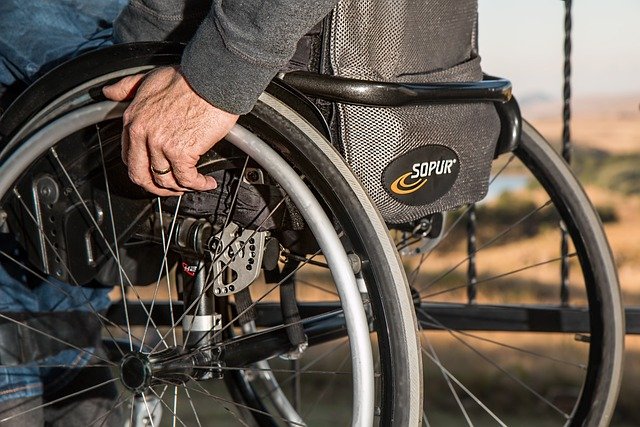Comprehensive Guide on How to Apply for VA Housing Grants for Disabled Veterans in the US in 2025
Disabled veterans in the United States have access to valuable housing grants through the Department of Veterans Affairs designed to improve accessibility and independence. These programs provide financial assistance for home modifications, adaptive equipment, and specially adapted housing to accommodate service-connected disabilities. Understanding the application process, eligibility requirements, and available grant types can help veterans secure the support they need to live comfortably and safely in their homes.

The Department of Veterans Affairs offers several housing grant programs specifically designed to assist disabled veterans with service-connected injuries. These grants help veterans modify existing homes or purchase specially adapted housing that accommodates their unique needs. Whether you require wheelchair accessibility, adaptive bathroom features, or other home modifications, VA housing grants can provide substantial financial support to improve your quality of life.
Understanding VA Housing Grants
VA housing grants are non-repayable funds provided to eligible veterans with service-connected disabilities. These grants differ from loans because they do not require repayment, making them an essential resource for veterans facing financial challenges related to disability accommodations. The primary purpose of these grants is to help veterans live independently by funding necessary home modifications or the purchase of adapted housing. Eligibility typically requires a service-connected disability rating and specific documentation from the VA. Veterans must own or will own the home where modifications will be made, and the property must be their permanent residence. The VA evaluates each application based on the veteran’s disability rating, the type of modifications needed, and whether the changes will significantly improve the veteran’s ability to live independently.
Types of VA Housing Grants
The VA administers three main housing grant programs for disabled veterans. The Specially Adapted Housing (SAH) grant provides up to $109,986 in 2025 for veterans with specific severe disabilities, such as loss of use of both legs, blindness in both eyes with loss of use of one leg, or loss of use of one leg together with certain organic diseases or injuries. This grant helps veterans build, buy, or modify a home to accommodate their disabilities. The Special Housing Adaptation (SHA) grant offers up to $21,962 in 2025 for veterans with less severe but still significant service-connected disabilities, such as blindness in both eyes or loss of use of both hands. The Temporary Residence Adaptation (TRA) grant allows eligible SAH or SHA veterans to modify a family member’s home where they temporarily reside, providing up to $43,988 for SAH-eligible veterans and up to $7,817 for SHA-eligible veterans in 2025. Each grant type serves different needs and disability levels, ensuring comprehensive support across the veteran community.
Steps to Apply for VA Housing Assistance
Applying for VA housing grants requires careful preparation and documentation. First, obtain your VA disability rating by filing a claim with the VA if you have not already done so. Your disability must be service-connected and meet the specific criteria for SAH or SHA grants. Next, gather necessary documentation including your DD Form 214, medical evidence of your service-connected disability, and proof of home ownership or intent to purchase. Complete VA Form 26-4555, the application for Specially Adapted Housing or Special Home Adaptation Grant, which can be downloaded from the VA website or obtained at your local VA regional office. Submit your completed application along with all supporting documents to your regional VA office. The VA will review your application, verify your eligibility, and may request additional information or schedule a home inspection. Processing times vary, but most applications receive a decision within 60 to 90 days. If approved, you will receive authorization to proceed with home modifications or purchase. Work with VA-approved contractors when possible, and keep detailed records of all expenses as you may need to submit receipts for reimbursement or direct payment to contractors.
Funding Options for Disabled Veterans
Beyond VA housing grants, disabled veterans have access to additional funding resources to support housing needs. The VA Home Loan program offers favorable mortgage terms with no down payment requirement for eligible veterans, which can be combined with housing grants for maximum benefit. Some states offer supplemental grant programs or property tax exemptions for disabled veterans, providing additional financial relief. Nonprofit organizations such as Homes For Our Troops, Building Homes for Heroes, and the Gary Sinise Foundation build or modify homes for severely injured veterans at no cost. Veterans should also explore local community development programs and housing authorities that may offer assistance with home modifications or accessible housing options. Financial counseling services through the VA can help veterans understand their options and create a comprehensive plan for securing and maintaining suitable housing. Additionally, some veterans may qualify for Aid and Attendance benefits if they require regular assistance with daily living activities, providing monthly financial support that can help cover housing-related expenses.
| Program/Resource | Provider | Key Features | Estimated Grant Amount (2025) |
|---|---|---|---|
| Specially Adapted Housing Grant | Department of Veterans Affairs | For severe service-connected disabilities | Up to $109,986 |
| Special Housing Adaptation Grant | Department of Veterans Affairs | For significant but less severe disabilities | Up to $21,962 |
| Temporary Residence Adaptation | Department of Veterans Affairs | Modifications to family member homes | Up to $43,988 (SAH) / $7,817 (SHA) |
| VA Home Loan Program | Department of Veterans Affairs | No down payment, favorable terms | Varies by property value |
| Homes For Our Troops | Nonprofit Organization | Custom-built accessible homes | Full construction costs covered |
Grant amounts mentioned in this article are based on 2025 rates and may be adjusted annually. Independent research and consultation with VA representatives is advised before making housing decisions.
Common Challenges and Solutions
Veterans often encounter challenges when applying for housing grants, but understanding common issues can help streamline the process. Documentation delays frequently occur when medical records or disability ratings are incomplete, so ensuring all paperwork is current and comprehensive before applying is crucial. Some veterans face difficulties finding contractors experienced with VA-approved modifications, making it beneficial to request contractor recommendations from your local VA office. Application denials sometimes result from misunderstanding eligibility criteria, so carefully reviewing requirements and consulting with a VA benefits counselor can prevent unnecessary setbacks. Processing delays may extend timelines, particularly during high-volume periods, emphasizing the importance of applying as early as possible. Veterans should maintain regular communication with their assigned VA case manager and promptly respond to any requests for additional information. If your application is denied, you have the right to appeal the decision within one year, and seeking assistance from a Veterans Service Organization can improve your chances of a successful appeal.
Conclusion
VA housing grants provide essential support for disabled veterans seeking to maintain independence and improve their living conditions. By understanding the different grant types, following the application process carefully, and exploring supplementary funding options, veterans can access the resources needed to create safe, accessible homes. The combination of federal grants, state programs, and nonprofit assistance ensures that veterans with service-connected disabilities have multiple pathways to secure appropriate housing accommodations that honor their service and sacrifice.




